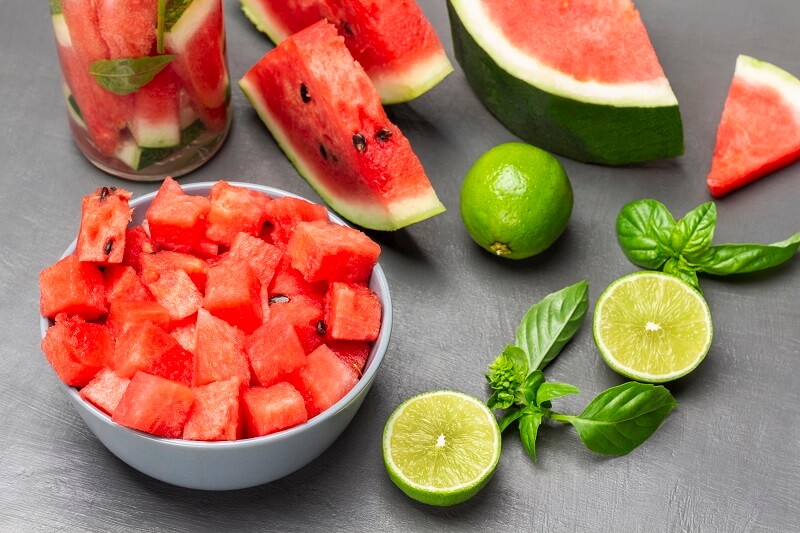Watermelon is refreshing, sweet, full of vitamins and minerals and doesn’t contain many calories. It’s the dessert you need all summer long to beat the heatwave and days when you feel like your routine is a bit overwhelming. Find out why it’s good to eat watermelon every day and its health benefits.
When you have a slice of watermelon with every meal, you know summer is here. Not only is it very tasty, sweet, juicy, but watermelon is also quite cheap in the height of the summer season, so you can eat it whenever you want.
Why it’s good to eat watermelon
Nutritionists explain that watermelon doesn’t have many calories or sugars, while it’s rich in vitamins, minerals and antioxidants. According to the US Department of Agriculture (USDA), 150g of watermelon contains the following:
Calories: 45.6;
Fat: 0.2 g;
Cholesterol: 0 mg;
Sodium: 1.52 mg;
Carbohydrates: 11.5 g;
Fiber: 0.6 g;
Vitamin C: 12.3 mg;
Potassium: 170 mg;
Calcium: 10 mg;
Vitamin A: 865 IU;
Lycopene: 6,890 micrograms.
Watermelon contains short-chain sugars that are difficult to digest for some people. If you’re in this category and you feel stomach upset after several slices of melon, it’s best to stick to the smaller amount at a meal.
Persons living with diabetes need to calculate the amount of carbohydrates they eat. Too many slices of melon can increase blood sugar levels and lead to fluctuations in blood sugar levels. This can make people with diabetes feel sick.
On the other hand, if you are healthy, you can eat watermelon every day. Bear in mind, however, that too much of any food can make you sick at some point.
The nutritional benefits of watermelons
The main benefit of a watermelon is that it doesn’t have many calories, but it contains most of the vitamins and minerals your body needs to remain healthy. Here are 11 of the health benefits of eating watermelon.

Contains a wide variety of vitamins and minerals
Eating just 150g of watermelon gives you 15% of your daily requirement of vitamin C, one of the most powerful antioxidants. It also contains potassium, vitamin A, vitamin B6, calcium and lycopene.
Vitamin C is known to strengthen the immune system and facilitate the absorption of iron in the body. Vitamin A is essential for skin and eye health, while potassium lowers blood pressure and improves the functioning of the nervous system. Vitamin B6 helps to process proteins, strengthen the immune system and also supports the nervous system.
Provides a high dose of lycopene
Lycopene is an antioxidant present in watermelon and other red fruits. Studies show that it can help lower the risk of various types of cancer and improve heart health and eye health, especially in adulthood. Regular consumption of fruits with lycopene content is beneficial because lycopene protects cells, and can regulate blood pressure.
Watermelon hydrates
Watermelon is 90% water and is therefore a good source of hydration, especially on hot days. If you tend not to drink enough water, then eating melon every day can be a delicious way to hydrate. It’s especially good after exercise, especially if you sprinkle a little salt on top. In this way you restore the balance of electrolytes and carbohydrates in the body.

Helps good digestion
Watermelon contains a lot of water, and a lot of fiber as well. Due to the latter, it supports digestion without speeding up the intestinal transit.
Helps maintain a normal weight
Watermelon can help you feel fuller for longer. A 2019 study published in the journal Nutrients showed that obese people who snacked on watermelon instead of low-fat crackers didn’t feel the urge to eat for several hours.
Daily watermelon consumption is associated with weight loss, lower body mass index, lower blood pressure and a smaller waist circumference.
Can support the heart
Research shows that foods containing lycopene may reduce the risk of cardiovascular disease and heart attack. A 2012 study published in the American Journal of Hypertension found a link between eating watermelon and lowering blood pressure over long periods of time.
May reduce the risk of cancer
Lycopene can reduce inflammation in the body and oxidative stress and bring free radicals into balance. Chronic inflammation can increase the risk of certain diseases, including cancer. Studies show that lycopene can decrease inflammation and inhibit cells responsible for triggering various types of cancer. Most research has shown good results for digestive tract and prostate cancer as well.
Watermelon reduces inflammation in the body
The combination of antioxidants and lycopene leads to reduced inflammation and oxidative stress. Inflammations lead to sweating, pain or skin problems. When they become chronic, inflammation is responsible for asthma, cancer, cardiovascular disease and type 2 diabetes.
Watermelon is good for skin health
The high content of water, vitamins A, B6 and C will help your skin to become suppler, smoother and free of blemishes. Vitamin C helps the production of collagen, which makes the skin more elastic and improves blood circulation. Vitamin A repairs skin cells and vitamin B6 can help heal certain heart diseases. Lycopene also protects the skin from the harmful effects of UV rays.
Reduces muscle pain
A study published in the Journal of Agricultural and Food Chemistry shows that athletes who drank watermelon juice became free of exercise-related muscle soreness for 24 hours. Watermelon juice also improved their heart rate. This research, however, needs more studies for confirmation.
Watermelon seeds and rind are also rich in nutrients
Watermelon seeds and rind are often thrown away, even though they are also packed with vitamins and minerals. The rind is low in carbohydrates and high in fiber, while the seeds are high in magnesium. The seeds can be dried and eaten as a snack.


